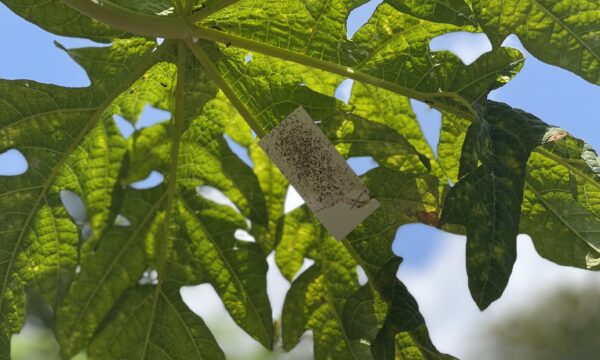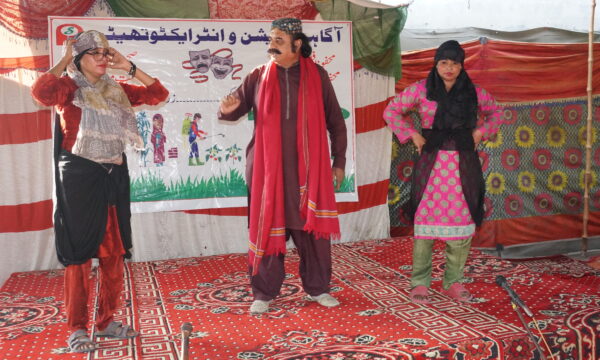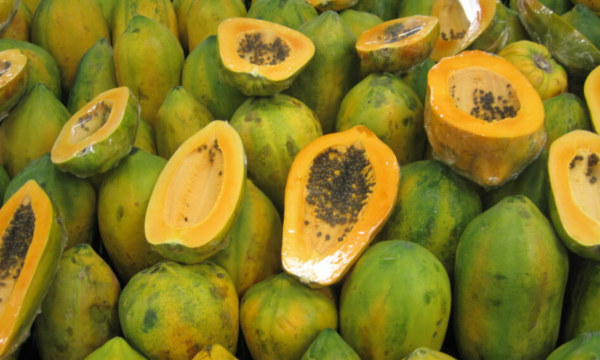
Plantwise hosted an exhibit stand during the G8 conference, giving demos of the Knowledge Bank. Credit: Patricia Neenan © CABI
With a successful first day at the G8 conference wrapped up, and hundreds of tweets posted with ideas for how open data can contribute to increased food security, Day 2 kicked off with Dr Kathryn Sullivan from NOAA welcoming the delegates, and a session on ‘What Does Open Data Look Like?’ chaired by Prof Tim Benton, who has guest blogged for Plantwise before. Join in the discussion on Twitter using #OpenAgData and #Plantwise, and follow us on Facebook for more news.
Day 2 #openagdata gets off to a flying start with a real rocket scientist. Kathy Sullivan – first woman to walk in space. Real high level!
— Trevor Nicholls (@trevornlifesci) April 30, 2013
Dr Sullivan @NOAA: Ag community relies on accurate, timely #weather #data. 10-14 day wx forecasts are as valuable today as ever #OpenAgData
— Dept. of Agriculture (@USDA) April 30, 2013
Dr Sullivan from NOAA highlights importance of weather data for agriculture.
#openagdata exhibit hall features @CABI_News #plantwise, @zedxinc and @battelle #Ag3s, and IDP @UofTX featuring students
— Rachel Melnick (@Plant_Doctor) April 30, 2013
Plantwise is exhibiting at the conference all day, giving demonstrations of the Plantwise Knowledge Bank.
Panel at #openagdata highlights physical and cultural constraints to data sharing. Even in genomics most data sharing by flying hard drives
— Trevor Nicholls (@trevornlifesci) April 30, 2013
How can large datasets be shared? Sending over the internet is still not the solution for everyone.
Suggestion from audience: upload #data in common formats (excel, access) 2 make accessible 2 largest geo and technical audience #openagdata
— Agrilinks (@Agrilinks) April 30, 2013
Idea on data format to make it most accessible.
Our #OpenAgData event just kicked off. We're happy to have the gov, media, @godigh & other stakeholders join us. pic.twitter.com/ce6OM86Gsl
— U.S. Embassy Ghana (@USEmbassyGhana) April 30, 2013
https://twitter.com/Adams_JaimeC/status/329257114742702082
Representatives from Ghana share their successes with open data.
.@mfarm_ke: Can we use tech + data to save farmers? Yes via mobile tools. Kenya has 13M mobile assets = 75% population coverage. #OpenAgData
— Dept. of Agriculture (@USDA) April 30, 2013
Kenya already has the mobile infrastructure to communicate information to farmers – many other countries in Africa are not far behind.
.@MFarm_ke: If you provide data, we're ready. We have platform to bring to farmers. Data can save lives. http://t.co/PSIBn5RCS5 #OpenAgData
— Dept. of Agriculture (@USDA) April 30, 2013
Offering a market access take on data for agriculture.
Linked data can help contextualise different types of information. @jahendler making sense of the #semanticweb for #OpenAgData.
— Afua (@aoa4eva) April 30, 2013
Putting data into context.
https://twitter.com/realwhirlwind/status/329259431672041472
The 5 musts of a global open data system.
Maggie Gill, DFID talks of importance of cultural differences and how this can lead to different interpretations of data #G8 #OpenAgData
— Kerry Albright (@AlbrightKerry) April 30, 2013
Prof Maggie Gill from DFID discusses the challenges of knowledge exchange and says that they aim to explore the demand for data in Africa.
Trevor Nicholls @cabiceo Is imp to establish plant health portals owned by developing countries themselves #G8 #OpenAgData conf
— Kerry Albright (@AlbrightKerry) April 30, 2013
Trevor Nicholls from CABI takes to the floor to introduce the Plantwise Knowledge Bank.
.@CABI_News: Data at work in #SierraLeone – cassava hit by incests, identified cause (grasshopper), nationwide campaign 2 remove #OpenAgData
— Agrilinks (@Agrilinks) April 30, 2013
How data collection has enabled a prompt response to pest outbreaks.
.@CABI_News: Challenges: getting good quality data & trade implications – gov'ts nervous abt being fully open on pests/diseases #OpenAgData
— Agrilinks (@Agrilinks) April 30, 2013
Not all countries want to share their pest and disease data for fears that this might affect trade.
There is a disconnect between good information and getting that info to farmers – says Aaron Clapp @USDA G8 #OpenAgdata conference.
— Global Food and Ag (@GlobalAgDev) April 30, 2013
Aaron Clapp from Hubbard Decision Research highlights the difficulties of communicating data to farmers.
Tim Benton of @FoodSecurityUK: Need to get better at thinking up/down. Think about systems instead of just #foodproduction. #OpenAgData
— Agrilinks (@Agrilinks) April 30, 2013
The UK’s Global Food Security Champion, Prof Tim Benton, thinks a ‘whole system’ approach is needed.
http://t.co/4YCySVCMfo. Open data to improve cassava breeding#openagdata
— johanneskeizer (@johanneskeizer) April 30, 2013
A tool that uses statistical models to predict how a plant variety will perform before it is tested in the field should improve efficiency of cassava breeding.
Amanda Collis, BBSRC, raises problem of sustainable funding for agricultural databases at G-8 #openagdata conference in Washington.
— K Eversole (@EversoleAssoc) April 30, 2013
Who’s going to pay for agricultural databases in the long term?
Bergvinson @gatesfoundation: If you want to go fast, go alone. If you want to go far, go together. Must come together globally #OpenAgData
— Dept. of Agriculture (@USDA) April 30, 2013
Thanks to everyone who tweeted during the conference. Follow the Plantwise blog and the CABI Facebook page for further news.
Several countries from the conference have developed action plans to make agricultural data open. These can be accessed here.
G8 Press Statement on the Action Plans:
[googleapps domain=”docs” dir=”file/d/0B4aXVC8hUc3oeEd2NE56LUpzcDA/preview” query=”” width=”640″ height=”480″ /]
How do you think open data can contribute to a sustainable increase in food security? Comment below or tweet your thoughts using #OpenAgData and #Plantwise.
Related News & Blogs
‘Sowing the seeds’ for food security in Uganda: CABI supports training for Quality Declared Seed production
CABI has been working with Zirobwe Agali-Awamu Agribusiness Training Association (ZAABTA), the Ministry of Agriculture, Animal Industry and Fisheries (MAAIF), the National Agricultural Research Organisation (NARO), and Integrated Seed Sector Developmen…
21 May 2025




